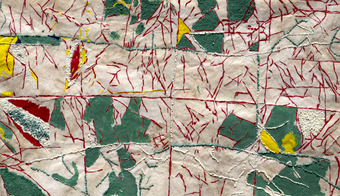Artists
Sammy Baloji is an artist who, since 2005, has been exploring the memory and history of the Democratic Republic of Congo. His work involves ongoing research on the cultural, architectural and industrial heritage of the Katanga region, as well as questioning the impact of Belgian colonization. He touches upon a variety of media to translate his research into artefacts. His use of photographic archives allows him to manipulate time and space, comparing ancient colonial narratives with contemporary economic imperialism. His video works, installations, sculptures, and photographic series highlight how identities are shaped, transformed, perverted and reinvented. Baloji’s recent exhibitions were at Goldsmiths CCA, Kunsthalle Mainz, and, Palazzo Pitti. His biennale participation include Bienal de São Paulo, the Architecture Biennale of Venice, Sharjah Biennial, Sydney Biennial, documenta 14, Lyon Biennial, and Venice Biennial.
Hadassa Ngamba is an artist from DRC, based between Brussels and Boma. Growing up and living in Boma (the prototype of Congolese industrialisation) and Lubumbashi (large mining city in the Haut-Katanga region), she has always been interested in Congo’s cartography in her work. Her research focuses particularly on the legacies of the slave and colonial trades on the country’s contemporary cartography and social, political and economic configurations. In 2019 Ngamba was artist in residence at WIELS Brussels. Her work is in the collections of S.M.A.K. in Gand (BE), IKOB in Eupen (BE), the National Bank of Beilgium in Brussels (BE), and the Morgan Stanley Bank in New York (USA).
Josèfa Ntjam is an artist, performer, and writer whose practice combines sculpture, photomontage, film and sound. Gleaning the raw material of her work from the internet, books on natural sciences and photographic archives, Ntjam uses the method of assemblage – of images, words, sounds, and stories – to deconstruct hegemonic discourses on notions of origin, identity, and race. Her work weaves multiple narratives drawn from investigations into historical events, scientific functions, and philosophical concepts, to which she confronts references to African mythology, ancestral rituals, religious symbolism, and science-fiction. Ntjam’s work and performances have been shown in numerous international museums and institutions, including Fotografiska, Barbican Center, Centre Pompidou, Stedelijk Museum, Palais de Tokyo, MuCAT, 15th Biennale de Lyon and Venice Biennale.
Dawit L. Petros is a visual artist, researcher and educator who examines the intertwined and multiple narratives of African and European colonialism and modernity. He draws from his study of history to engage with the effects of displaced or forgotten histories. Petros’ extensive research and travels inform production across materials and mediums, including photography, sculpture, screen prints, video, performance, and sound. Petros engages in a metaphorical dialogue with contemporary issues of displacement and place-making that challenge traditional forms of narrative representation associated with documentary imaging. Petros has exhibited widely, including at Haus der Kunst, Wereld Museum, Tate Modern, Ozangé Spanish Biennial of African Photography, Malaga, Oslo Kunstforening, Huis Marseille Museum of Photography, The Studio Museum in Harlem, The National Museum of African Art (Washington) and the Bamako Biennale in Mali.
Conveners
Carine Harmand is The John Ellerman Foundation Curator at Tate Liverpool, where part of her role develops an art programme across Tate and the International Slavery Museum. She has curated the exhibition of South African artist Zanele Muholi at Tate Modern in 2024. Her work also focuses on sustainable art and institutional practices and climate justice; she has curated You Get a Car [Everybody Gets a Car] a project with RESOLVE Collective at Tate Liverpool which effectively redistributed resources in the creative sector. Her research explores transnational discourses in art history, with a focus on art from Africa and its diaspora, West Asia and Latin America.
Adiva Lawrence is a curator at the International Slavery Museum in Liverpool and an academic with expertise in the arts of the African diaspora, histories of colonialism and slavery and museum studies. She was recently awarded a PhD from the University of Hull (UK) exploring the representation of slavery in museums and in contemporary artistic practices. She has published pieces on postcolonial museums and exhibitions, Black Atlantic art and the legacies of slavery.
Dr. Portia Malatjie is Adjunct Curator of Africa and African Diaspora at the Hyundai Tate Research Centre: Transnational, Tate Modern, and a Senior Lecturer in Art History and Discourse of Art at the Michaelis School of Art, University of Cape Town. She is co-curator of Ecologies of Elsewhere and When Rain Clouds Gather: Black South African Women Artists, 1940 – 2000, as well as curator of the South African Pavilion at the 60th Venice Biennale with an exhibition titled Quiet Ground. Her research explores African conceptions of Blackness through sound, spirituality, and Black Feminism. Malatjie was a 2023 Yale University visiting fellow in the Department of the History of Art.
Odessa Warren is a curator based in London whose work engages with transnational art histories and critical ecologies, with a focus on modern and contemporary art from the Arab world. She is currently Assistant Curator, International Art at Tate Modern where she works on exhibitions, displays, live programmes and collection research. She is affiliated with Hyundai Tate Research Centre: Transnational where she has organised and delivered major international public programmes. Most recently Confluences: Stories of Art at the 14th Gwangu Biennale, as well as Unlearning the Modern: Art and Indigeneity in Latin America with MUAC in Mexico City. Independently, she convened and curated the programme War-Torn Ecologies: Resistant Worlds with Beirut Art Center and The Mosaic Rooms. In 2022, she curated Dala Nasser’s first UK solo exhibition entitled Time Spent Without its Flow. She has previously worked with Forensic Architecture, Beirut Art Centre and The Palestinian Museum. She holds degrees from University College London and Goldsmiths University.


